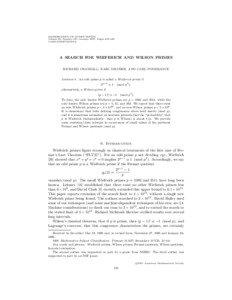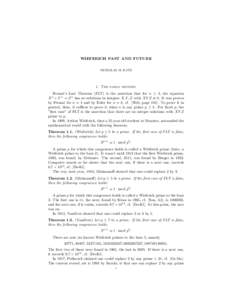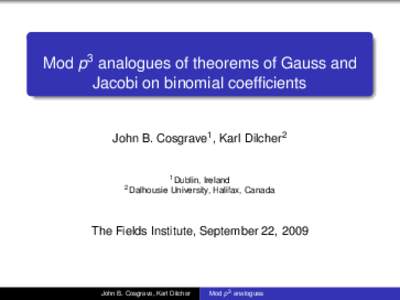<--- Back to Details
| First Page | Document Content | |
|---|---|---|
 Date: 2005-03-02 15:21:07Integer sequences Wieferich prime Finite fields Prime number Modular arithmetic Integer factorization algorithms Fermat number Wilson prime Fermat quotient Mathematics Number theory Numbers |
 | WIEFERICH PAST AND FUTURE NICHOLAS M. KATZ 1. The early history Fermat’s Last Theorem (FLT) is the assertion that for n ≥ 3, the equation X n + Y n = Z n has no solutions in integers X, Y, Z with XY Z 6= 0. It was prDocID: 1pVOO - View Document |
 | Mod p3 analogues of theorems of Gauss and Jacobi on binomial coefficients John B. Cosgrave1 , Karl Dilcher2 1 Dublin,DocID: O74s - View Document |
 | Acta Mathematica Universitatis Ostraviensis Jiří KlaškaDocID: 4ecG - View Document |
![Serdica J. Computing[removed]), 293–300 SEARCH FOR WIEFERICH PRIMES THROUGH THE USE Serdica J. Computing[removed]), 293–300 SEARCH FOR WIEFERICH PRIMES THROUGH THE USE](https://www.pdfsearch.io/img/3e02aeb1be6c02eb684828cf3c7d25e2.jpg) | Serdica J. Computing[removed]), 293–300 SEARCH FOR WIEFERICH PRIMES THROUGH THE USEDocID: 3UWF - View Document |
 | PDF DocumentDocID: 1jsv - View Document |
